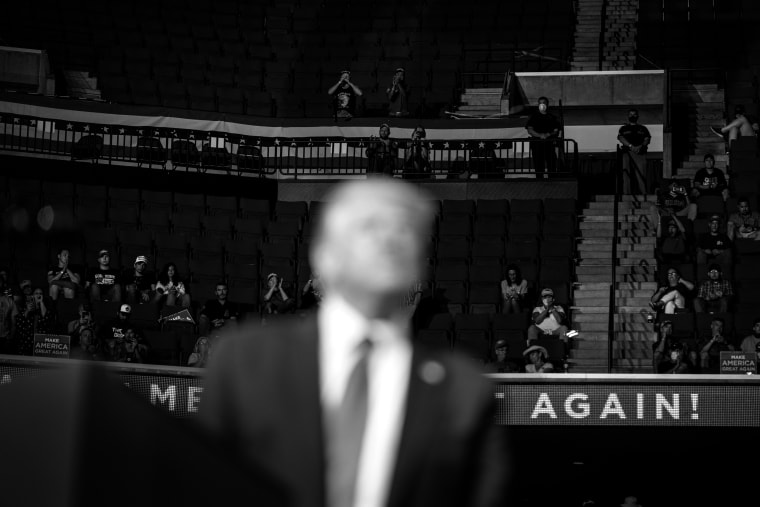Analysis: Rather than a silent majority, the president demonstrated the limits of his base's support.

"The silent majority is stronger than ever before," Trump said Saturday night. But the poor turnout in Tulsa suggests just the opposite — that enthusiasm for him is weaker than it appears. Evan Vucci / AP
By Jonathan Allen
NBC News
After bragging earlier in the week that more than 1 million people had signed up to come see him, Trump found that he couldn't fill a 19,000-seat arena in a state where he won by 36 percentage points and on a night that his aides had promoted as a major show of his strength.
The sparse crowd in Tulsa, Oklahoma, was more than just a humiliation for Trump. It weakened a key argument of his re-election narrative. To explain how he might be able to win despite poor polling numbers — and amid national crises — he has posited that a "silent majority" of Americans back him.
"The silent majority is stronger than ever before," Trump said Saturday night.
But the poor turnout suggests just the opposite — that enthusiasm for him is weaker than it appears. That isn't likely to sit well with Trump, who gambled that his backers were so loyal they would brave the risk of spreading coronavirus to see him in person.
His bet backfired. Rather than receiving a jolt of energy, Trump got a dose of reality. Worse yet, for the president, it was delivered at a time when he desperately needs to reset the frame of the election.
For most of the last four months, when Trump had expected to tour the country in service of his re-election, he has been running a Rose Garden campaign. Most Americans don't approve of his handling of the coronavirus, his response to nationwide protests against systemic racism, or both. And his rival, presumptive Democratic presidential nominee Joe Biden, has seized a sizable polling lead.
To get him out of the West Wing doldrums and back into fighting mode, his political team had planned a rally that would re-energize him by demonstrating the commitment of the Trump faithful. It was so important that he went forward with it despite having to move the date so that it wouldn't conflict with Juneteenth.
Charlie Kirk, founder of the pro-Trump student group Turning Point USA, said afterward on Fox News that it had been "too long" since the president had held one of his signature events.
"It’s so refreshing to see the president back in front of his base," Kirk said, channeling the thinking of many Trump allies. "Finally, he’s back on offense, putting the Democrats on defense."
But while Trump delivered a series of broadsides to adversaries real and imagined — he devoted more than 10 minutes to enumerating excuses for why he had difficulty descending a ramp while at West Point last week — it was difficult, at times, to tell exactly which side he was taking.
"They want to demolish our heritage so they can impose their new oppressive regime in its place," Trump said of the removal of statues to Confederate leaders in the wake of protests against police killings of Black men and women. A little bit later, he claimed to have "done more for the Black community in four years" than Biden ever has.
It was a boastful night for the president, who also praised himself for the federal response to coronavirus.
"I have done a phenomenal job with it," he said. "I saved hundreds of thousands of lives. We don't ever get a mention."
Epidemiologists say that the U.S. death toll would have been much lower if the president and other government officials had pushed policies like social distancing sooner.
All in all, Trump's hour-plus speech sounded familiar in its mix of grievance, self-congratulation and invective against political adversaries. But what was notably different from typical Trump rallies was the muted reaction from the audience. The one thing Trump needed more than anything, he didn't get.
There were no deafening chants of "build the wall" or other crowd favorites. He wasn't often forced to pause for applause. And, with his upper lip and cheek shining for most of the night, Trump appeared to be working hard to sustain the modest energy in the room.
That should have served as a reality check for him: right now, his supporters amount to less of a "silent majority" than an absent minority.